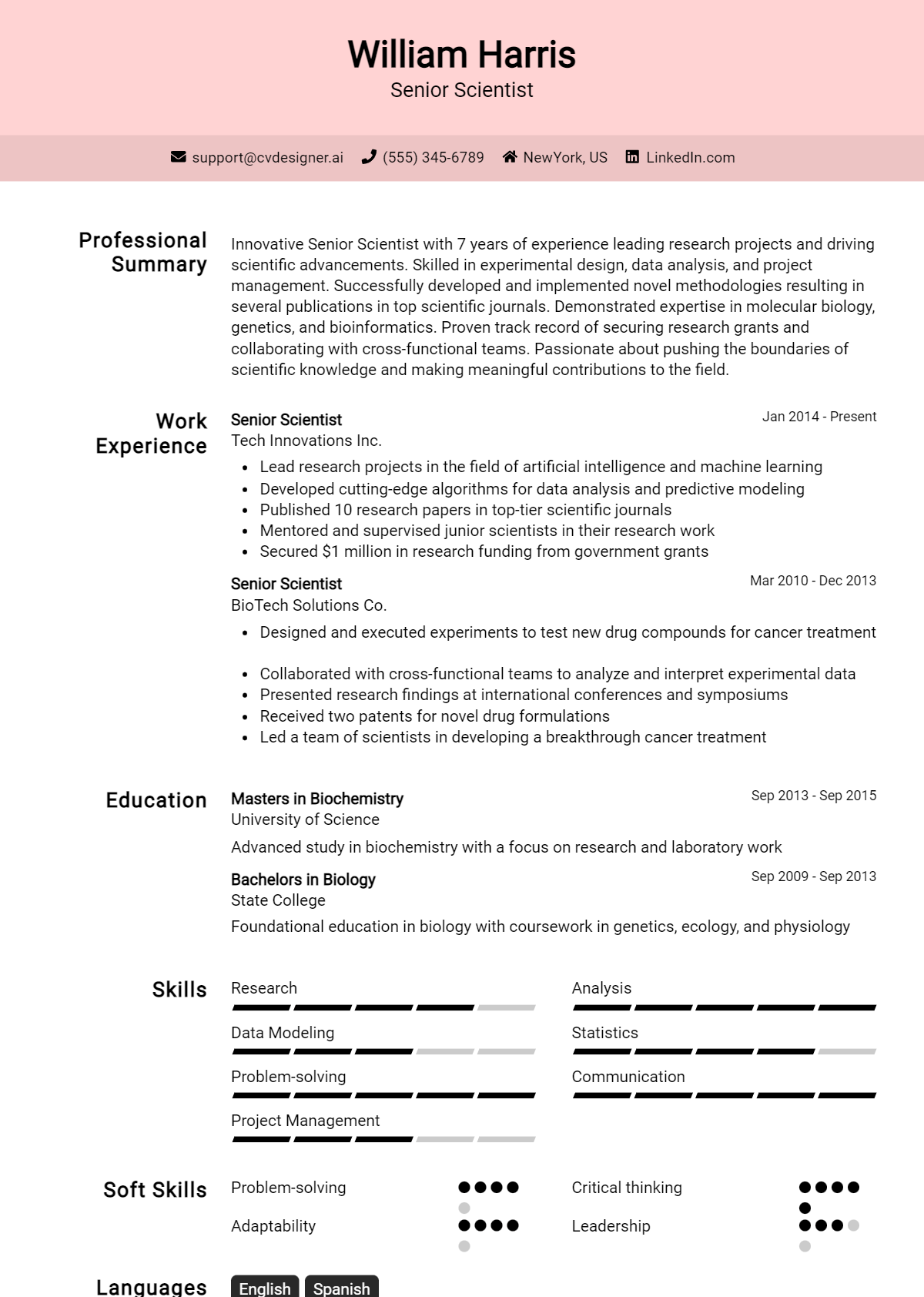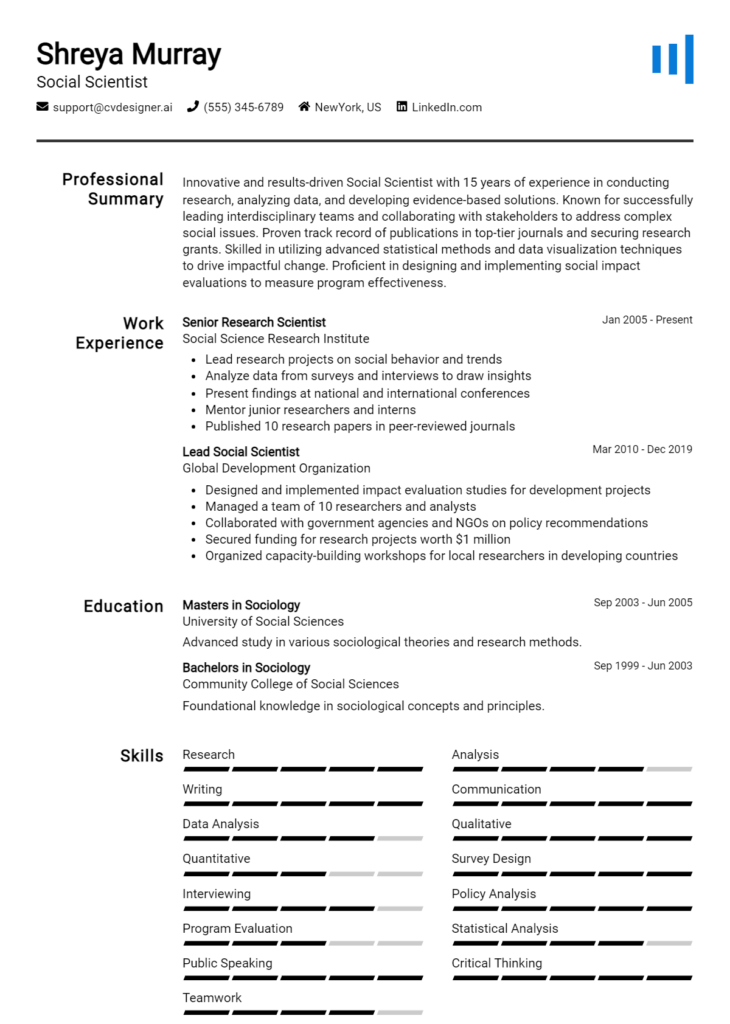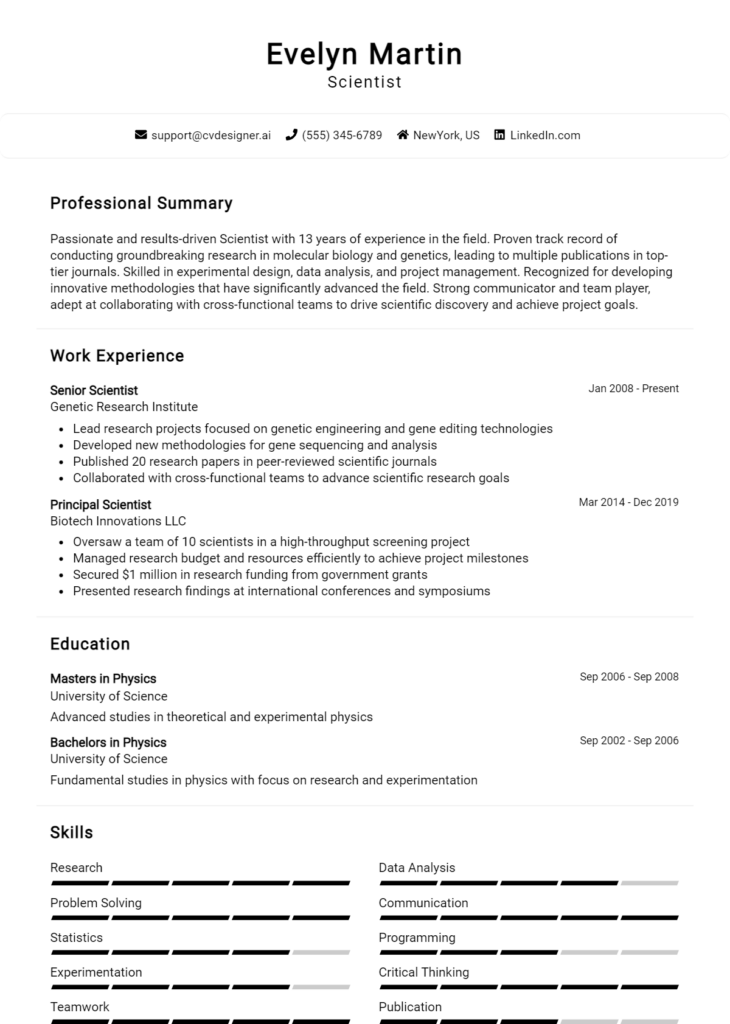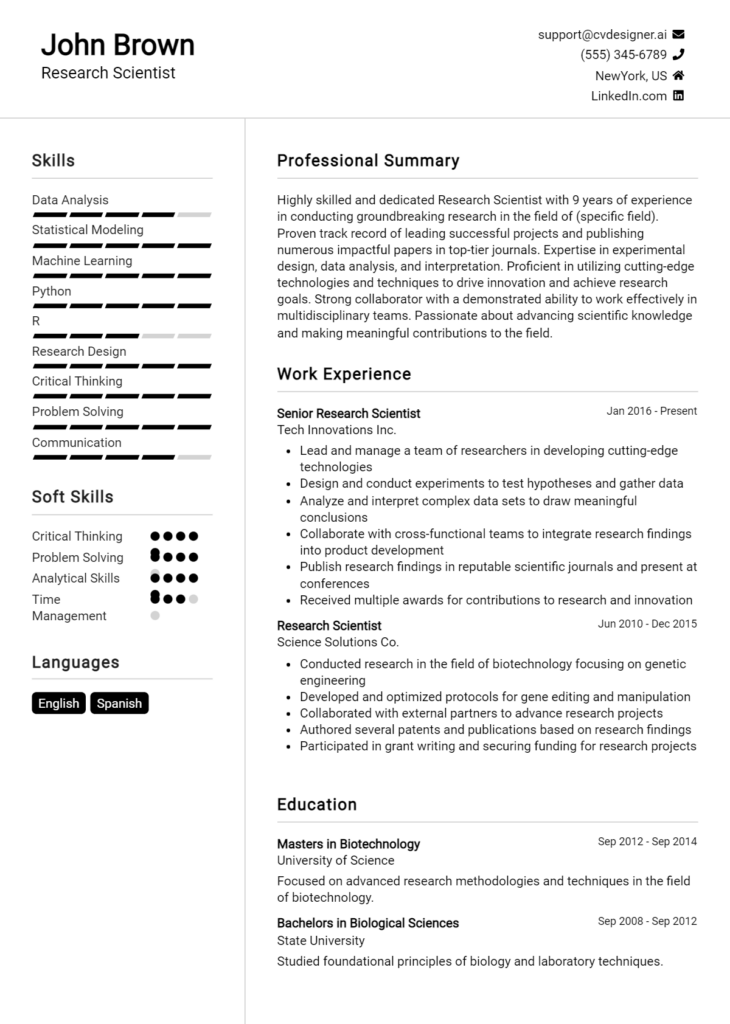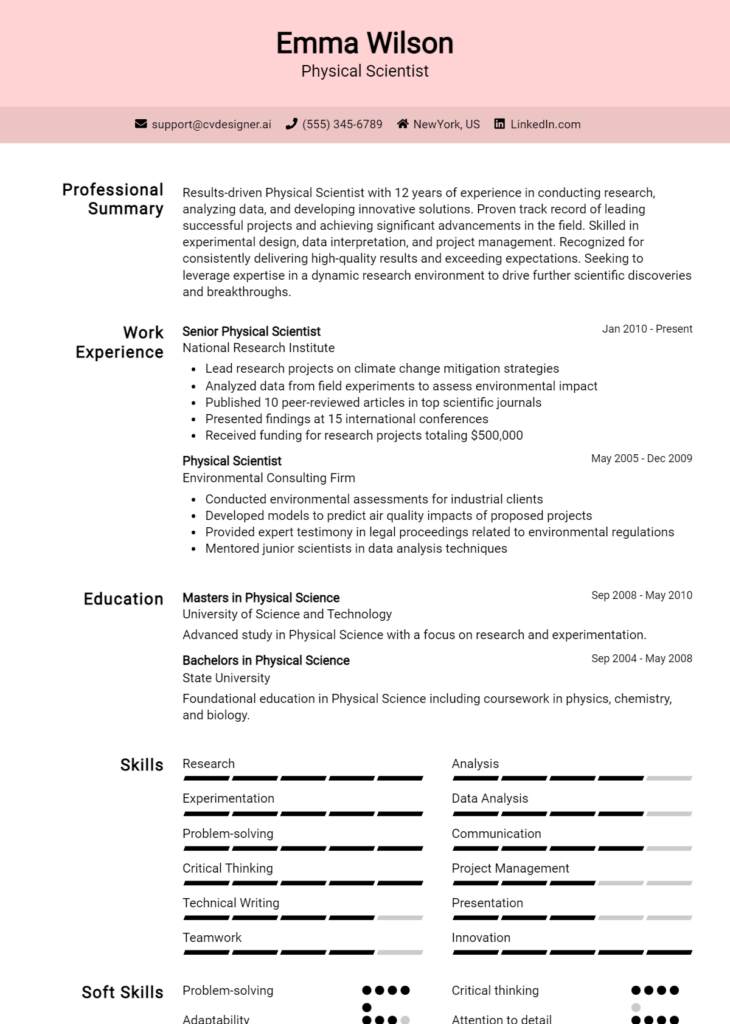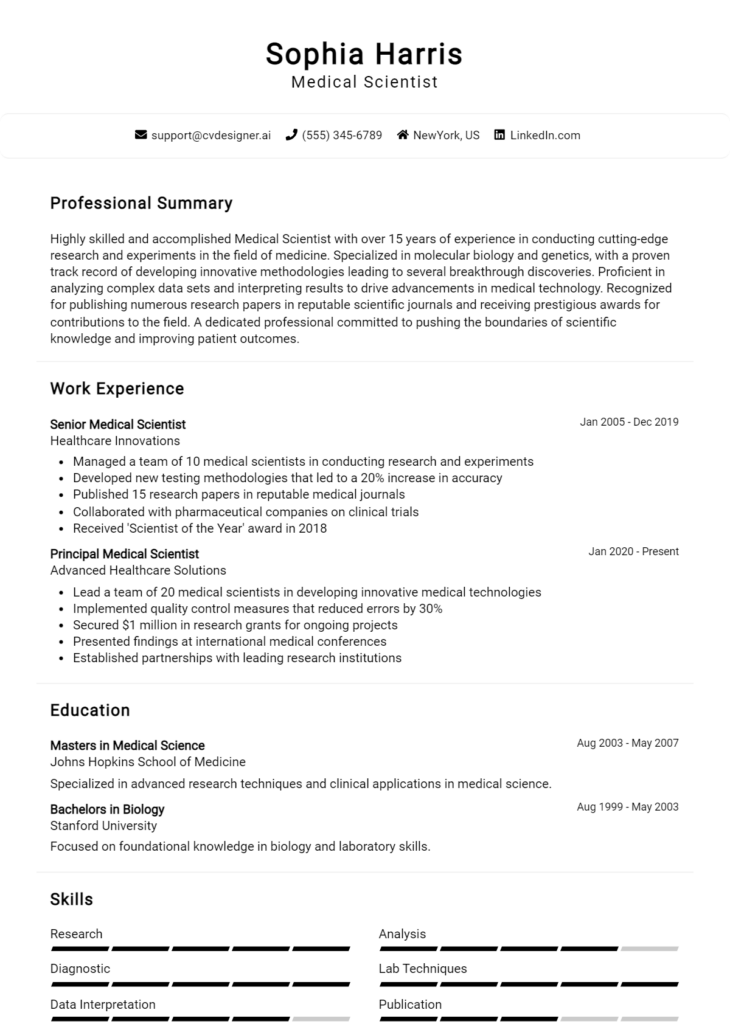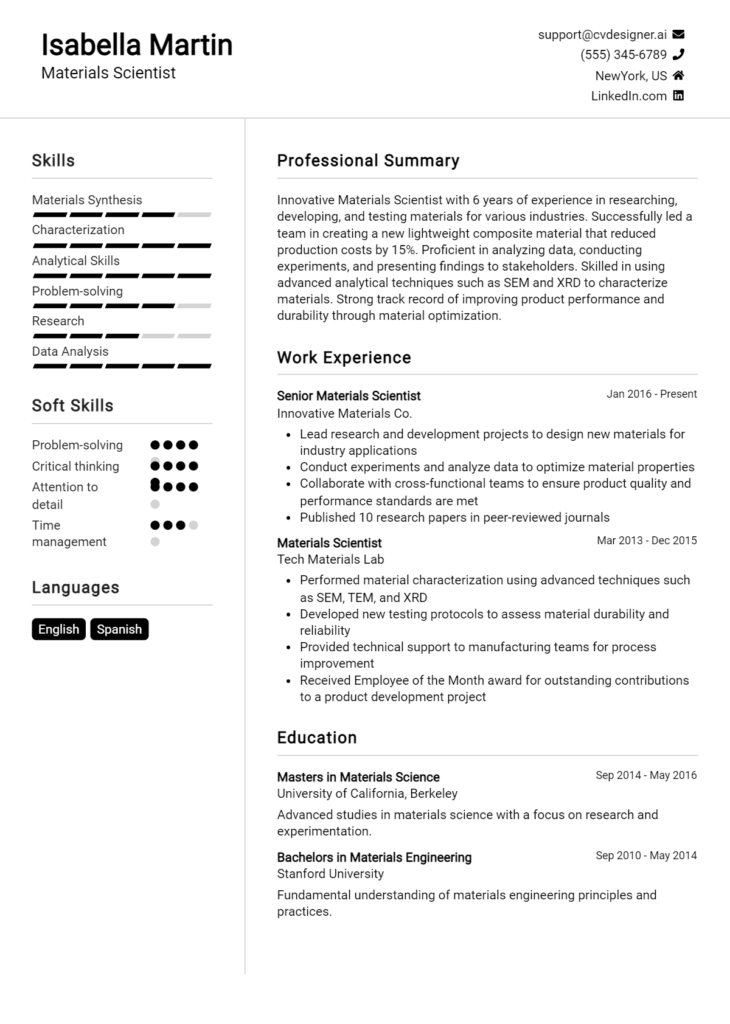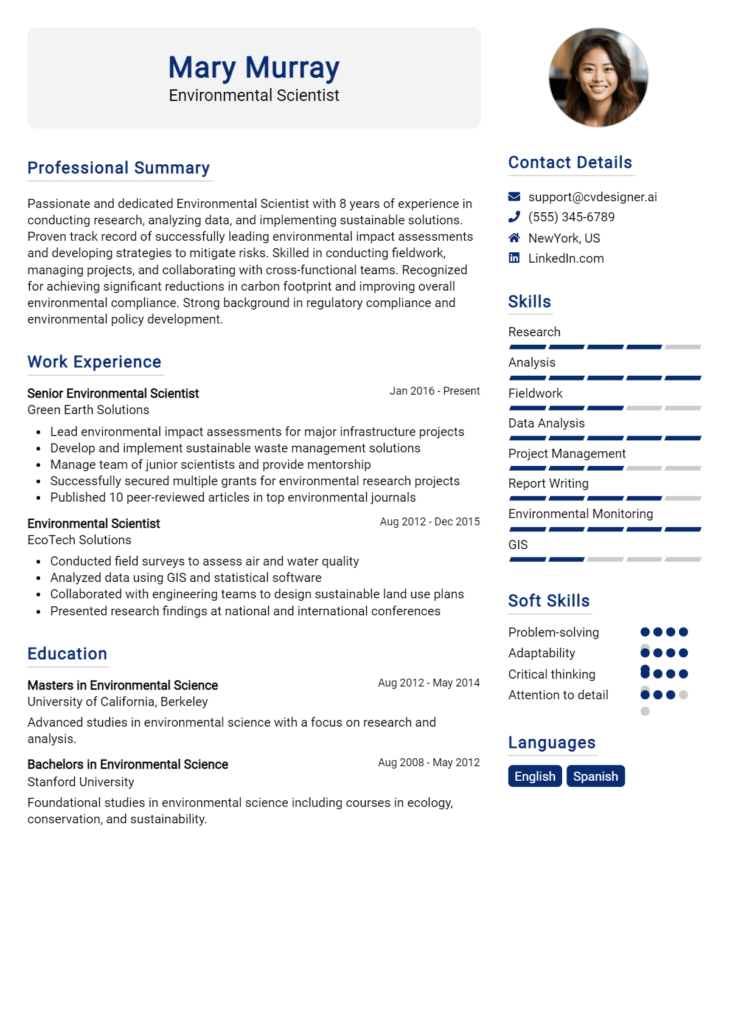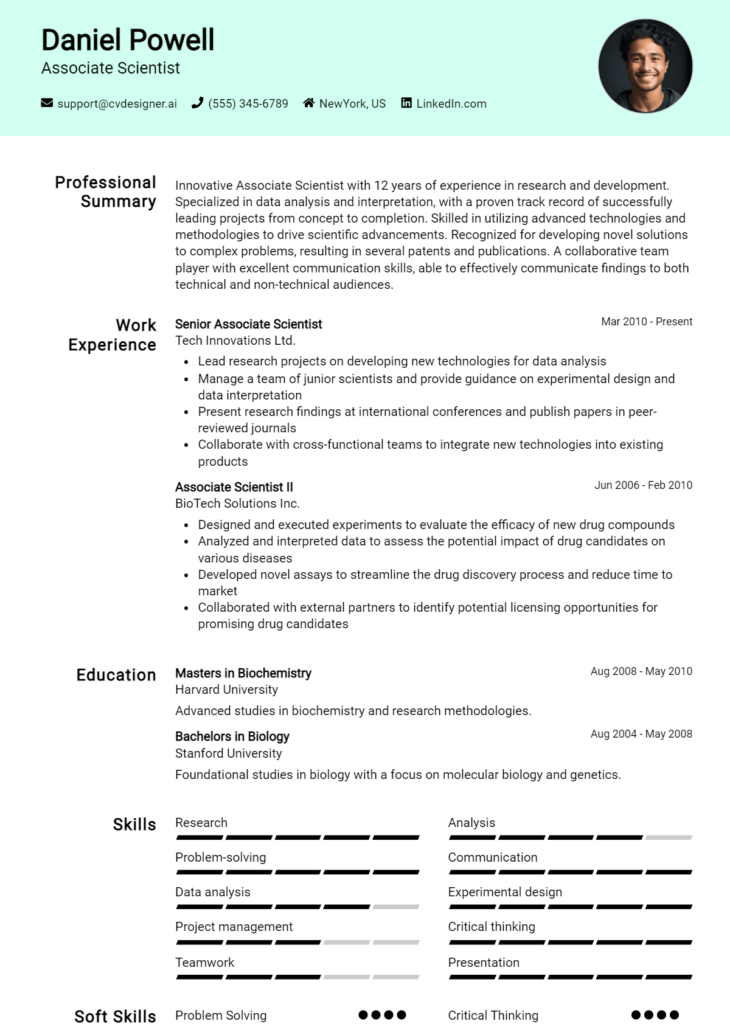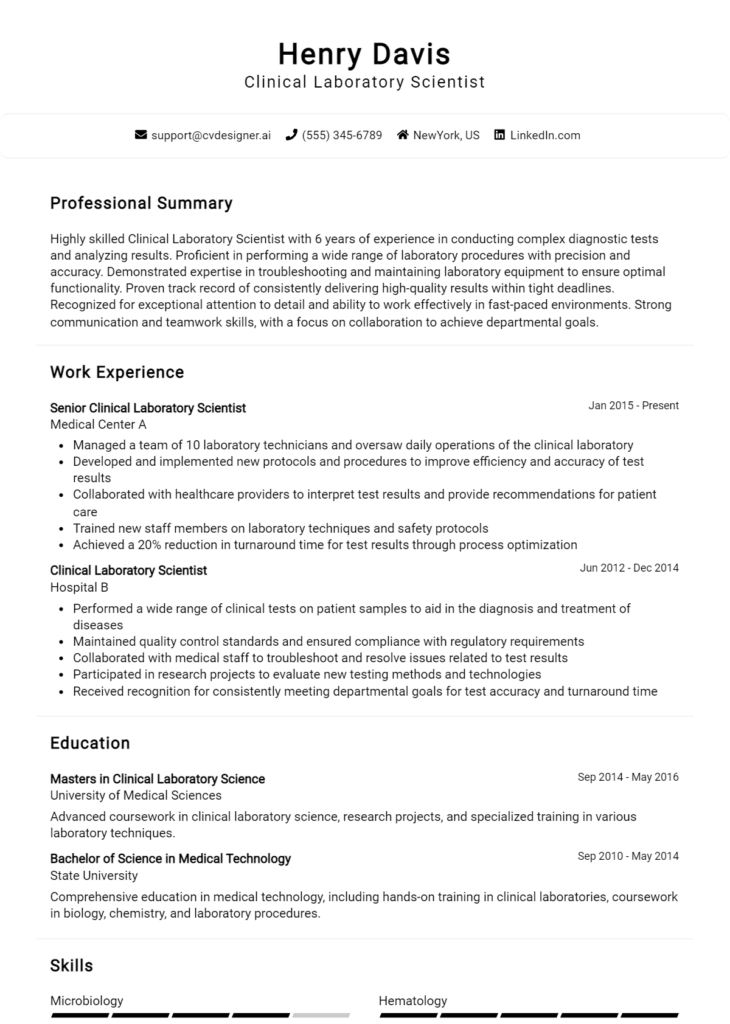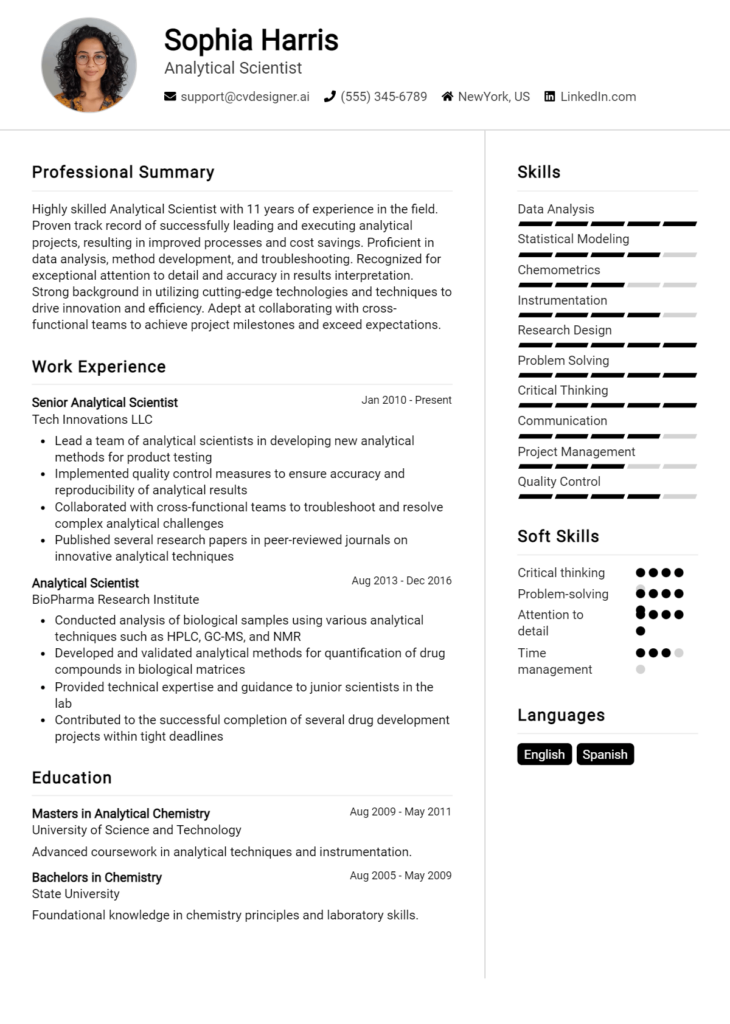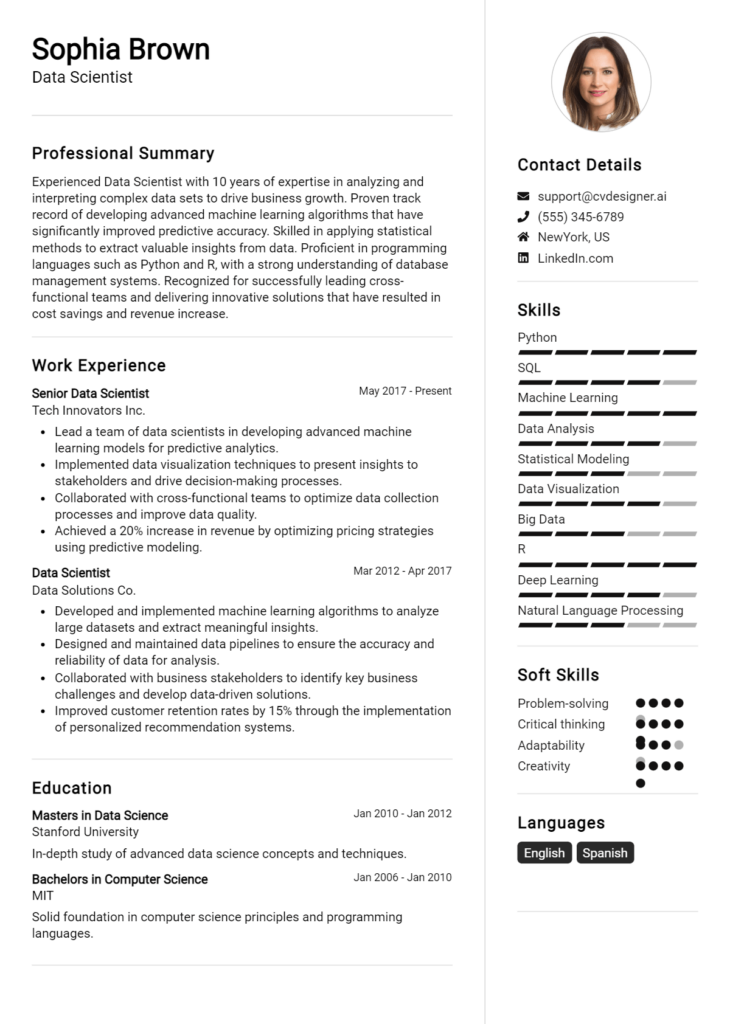Most Popular Senior Scientist Resume Examples
Explore additional Senior Scientist resume samples and guides and see what works for your level of experience or role.
The role of a Senior Scientist is pivotal in driving innovation and advancing knowledge across various fields, from pharmaceuticals to environmental science. As experts in their domain, Senior Scientists are responsible for leading research projects, mentoring junior staff, and delivering groundbreaking results that can significantly impact society. Given the competitive nature of this field, a well-crafted resume is not just a document; it's your ticket to showcasing your expertise and accomplishments. A compelling resume can set you apart from the competition, making it essential to understand how to present your qualifications effectively.
In this comprehensive resume writing guide tailored for Senior Scientists, we will explore several key aspects that will enhance your job application. We will delve into the specific responsibilities and skills that define a Senior Scientist, helping you articulate your experience with precision. You will learn about the best formats to use that cater to your unique background, as well as common mistakes to avoid that could undermine your chances of landing an interview. Additionally, we will provide resume examples catering to various experience levels, alongside tips on crafting a standout resume and selecting the right resume templates to elevate your presentation. Whether you are an established professional or looking to advance your career, this guide is designed to equip you with the knowledge to create a resume that resonates with hiring managers.
Key Responsibilities and Skills for a Senior Scientist
As a Senior Scientist, you are expected to lead research projects, develop innovative methodologies, and contribute to scientific advancements within your field. Your role involves both independent and collaborative work, where you will mentor junior scientists and work closely with cross-functional teams. The key responsibilities typically associated with this position include:
- Designing and executing complex experiments to test hypotheses.
- Analyzing data and interpreting results to derive meaningful conclusions.
- Publishing research findings in peer-reviewed journals and presenting at conferences.
- Leading and managing research projects, ensuring they align with organizational goals.
- Collaborating with other scientists, engineers, and stakeholders to drive project success.
- Mentoring and training junior scientists and interns in laboratory techniques and best practices.
- Staying updated with the latest scientific advancements and technologies relevant to your research area.
To excel as a Senior Scientist, the following essential skills are required:
- Strong analytical and problem-solving abilities.
- Proficiency in relevant laboratory techniques and equipment.
- Excellent written and verbal communication skills.
- Experience with statistical analysis and data visualization software.
- Project management skills, including the ability to prioritize and manage multiple tasks.
- Innovative thinking and creativity in research design and implementation.
- Leadership and mentorship capabilities.
Highlighting these skills effectively in the resume skills section is crucial for demonstrating your qualifications to potential employers. Tailoring these responsibilities and skills to align with the specific job description can significantly enhance your chances of securing an interview. Additionally, consider how these skills could be relevant in creating a strong CV, showcasing not just your technical expertise but also your ability to contribute to collaborative projects and lead teams within your organization.
Best Resume Format and Structure for a Senior Scientist
When crafting a resume for a Senior Scientist position, it's essential to choose a format that highlights your qualifications, experiences, and skills effectively. Here’s a detailed guide on the best resume format and structure for a Senior Scientist:
Contact Information
- Name: Use a larger font size for your name to make it stand out.
- Phone Number: Ensure your voicemail is professional.
- Email Address: Use a professional email address, ideally a variation of your name.
- LinkedIn Profile: Include a link to your LinkedIn profile if it contains relevant information.
- Location: City and state are sufficient; no need for a full address.
Professional Summary
- Length: 3-5 sentences.
- Content: Summarize your qualifications, expertise, and what you bring to the role. Highlight your years of experience, key achievements, and specific areas of specialization (e.g., molecular biology, pharmacology).
- Tailor: Customize this section for each application to align with the job description.
Work Experience
- Format: Use reverse chronological order, starting with your most recent position.
- Structure:
- Job Title, Company Name, Location (Month/Year – Month/Year)
- Bullet Points: Use bullet points to describe your responsibilities and achievements. Start each point with action verbs (e.g., "developed," "led," "conducted").
- Quantify Achievements: Whenever possible, include numbers to demonstrate impact (e.g., "increased research efficiency by 20% through process optimization").
- Relevance: Focus on experiences that are most relevant to the Senior Scientist role you are applying for.
Education
- Degree(s): List your highest degree first.
- Institution Name, Location (Month/Year of Graduation)
- Relevant Coursework or Projects: Include if pertinent to the role.
- Honors or Awards: Mention any academic honors or relevant awards.
Skills
- Technical Skills: List laboratory techniques, software, and scientific methods relevant to your field (e.g., CRISPR, statistical analysis software).
- Soft Skills: Include skills such as communication, leadership, and project management.
- Format: Use bullet points or a simple list format for clarity.
Certifications
- Relevant Certifications: Include any professional certifications that enhance your qualifications (e.g., Clinical Research Coordinator, Six Sigma).
- Format: List the certification name, issuing organization, and date obtained.
Additional Sections (Optional)
- Publications: If applicable, include a section for relevant publications in scientific journals.
- Conferences and Presentations: Mention any significant presentations or conferences you've attended.
- Professional Affiliations: List memberships in relevant professional organizations.
Resume Format Tips
- Length: Aim for 1-2 pages, depending on your experience.
- Font and Size: Use a professional font (e.g., Arial, Calibri) in 10-12 point size for body text.
- Margins: Keep margins at 0.5 to 1 inch for a clean look.
- File Format: Save your resume as a PDF to preserve formatting when sending electronically.
Complementing Cover Letter Format
The resume format should align with your cover letter format to create a cohesive application package. Use the same font, header, and style elements in both documents. In your cover letter, expand on your qualifications and express your enthusiasm for the role, complementing the highlights presented in your resume. This consistency will enhance your professionalism and make a strong impression on potential employers.
Writing Tips and Best Practices for a Senior Scientist Resume
Crafting a compelling resume as a Senior Scientist requires a strategic approach that highlights your expertise and contributions to the field. Focus on presenting your qualifications clearly and concisely, tailoring your resume to the specific job you are applying for. Utilize action verbs to convey your achievements dynamically, and ensure to quantify your accomplishments whenever possible to provide context and demonstrate impact. Incorporating industry-specific keywords will not only enhance your chances of passing applicant tracking systems but also resonate with hiring managers familiar with the terminology. Remember to maintain a professional look by utilizing effective resume writing tips, and consider how these practices can also be applied to drafting a persuasive cover letter.
- Use strong action verbs such as "developed," "led," "analyzed," and "optimized" to describe your responsibilities and achievements.
- Quantify your accomplishments by including specific metrics, such as percentage improvements, funding amounts secured, or number of projects successfully completed.
- Tailor your resume for each application by including relevant industry-specific keywords that match the job description.
- Organize your resume with clear headings and bullet points to enhance readability and allow hiring managers to quickly scan for pertinent information.
- Highlight interdisciplinary collaboration or leadership roles to showcase your ability to work effectively in diverse teams.
- Include any publications, patents, or presentations to demonstrate your contributions to scientific knowledge and innovation.
- Keep your resume to two pages or less, focusing on the most relevant experiences and skills that align with the position.
- Regularly update your resume to reflect new skills, experiences, and achievements, ensuring it remains current and relevant.
Common Mistakes to Avoid in a Senior Scientist Resume
A well-crafted resume is essential for a Senior Scientist position, as it serves as a reflection of your expertise, experience, and suitability for the role. However, many candidates make common mistakes that can undermine their chances of landing an interview. Avoiding these pitfalls will help you present your qualifications in the best possible light. Here are some common mistakes to steer clear of:
- Overloading the resume with excessive information or irrelevant details.
- Using generic descriptions that fail to highlight specific skills and accomplishments.
- Neglecting to tailor the resume for the specific job or institution.
- Failing to quantify achievements with data, metrics, or outcomes.
- Ignoring the importance of a clear and organized structure.
- Using jargon or overly technical language that may not be understood by all readers.
- Omitting key sections, such as publications, presentations, or grants.
- Not proofreading for spelling and grammatical errors.
- Including outdated or irrelevant experiences that do not align with the current job market.
- Overemphasizing responsibilities rather than showcasing achievements.
To enhance your resume and avoid these common mistakes, consider reviewing the common mistakes to avoid in a resume. Additionally, don't forget to pay attention to your cover letter; it’s just as important to avoid common cover letter mistakes that could jeopardize your application.
Sample Senior Scientist Resumes
As the demand for innovative scientific solutions continues to grow, the role of a Senior Scientist has become increasingly vital across various industries. This position requires a solid foundation in research and development, technical expertise, and strong leadership skills. Below are three sample resumes tailored for different stages of a Senior Scientist's career—an experienced professional, an entry-level candidate, and a career changer. Feel free to explore more resume templates for inspiration. Additionally, corresponding cover letter examples can help you create a complete job application package.
Experienced Senior Scientist Resume
Name: Dr. Emily Johnson
Address: 123 Research Lane, Science City, ST 54321
Phone: (123) 456-7890
Email: emily.johnson@email.com
Summary:
Accomplished Senior Scientist with over 10 years of experience in drug development and molecular biology. Proven track record of leading cross-functional teams in high-stakes research environments. Adept at designing and executing experiments, analyzing data, and presenting findings to stakeholders.
Education:
Ph.D. in Molecular Biology
University of Science, City, ST
Graduated: May 2012
Professional Experience:
Senior Scientist
BioPharma Innovations, Science City, ST
June 2015 - Present
- Lead a team of 8 scientists in the development of novel therapeutic agents, resulting in 3 successful IND applications.
- Spearheaded a research project that reduced drug formulation time by 30%, saving the company $500,000 annually.
- Collaborated with regulatory agencies to ensure compliance with industry standards and expedite product approval.
Research Scientist
HealthTech Solutions, Science City, ST
July 2012 - May 2015
- Conducted experiments on protein interactions, contributing to multiple peer-reviewed publications.
- Assisted in the development of a biomarker discovery platform which increased diagnostic accuracy by 25%.
- Mentored junior scientists and interns, fostering a collaborative research environment.
Skills:
- Drug development and formulation
- Molecular and cell biology
- Data analysis and interpretation
- Project management
- Team leadership
Entry-Level Senior Scientist Resume
Name: Alex Smith
Address: 456 Innovation Drive, Research Town, ST 67890
Phone: (234) 567-8901
Email: alex.smith@email.com
Summary:
Motivated and detail-oriented recent Ph.D. graduate with a specialization in biotechnology. Eager to apply laboratory skills and research experience to contribute to scientific advancements. Strong analytical and communication abilities.
Education:
Ph.D. in Biotechnology
University of Research, Town, ST
Graduated: May 2023
Internship Experience:
Research Intern
Genetics Labs, Research Town, ST
June 2022 - August 2022
- Assisted in the development of CRISPR-based gene editing techniques for crop improvement.
- Conducted data analysis using statistical software, contributing to project reports and presentations.
- Collaborated with a team of scientists on experimental design and methodology.
Graduate Research Assistant
University of Research, Town, ST
September 2019 - May 2023
- Conducted independent research on cell signaling pathways in cancer cells, leading to one publication.
- Presented research findings at two national conferences, receiving positive feedback from peers.
- Managed laboratory inventory and equipment maintenance, ensuring smooth operation of research activities.
Skills:
- Molecular cloning and sequencing
- Statistical analysis and software (R, SPSS)
- Strong written and verbal communication
- Team collaboration
- Problem-solving
Career Changer Senior Scientist Resume
Name: Jessica Taylor
Address: 789 Discovery Way, Innovation City, ST 13579
Phone: (345) 678-9012
Email: jessica.taylor@email.com
Summary:
Dynamic professional with 8 years of experience in data analysis and project management in the tech industry, transitioning to a Senior Scientist role. Committed to leveraging analytical skills and a passion for science to drive research projects forward.
Education:
M.S. in Data Science
Tech University, Innovation City, ST
Graduated: December 2020
Relevant Experience:
Data Analyst
Tech Solutions, Innovation City, ST
January 2016 - Present
- Analyzed large datasets to inform product development and improve customer satisfaction, resulting in a 15% increase in retention rates.
- Developed predictive models that guided strategic decision-making, enhancing operational efficiency.
- Collaborated with cross-functional teams to translate complex data into actionable insights.
Volunteer Research Assistant
Community Science Lab, Innovation City, ST
June 2020 - December 2021
- Participated in a community-based research project studying local biodiversity and its ecological impact.
- Assisted in field data collection and laboratory analysis, gaining hands-on experience in scientific research methods.
- Contributed to the writing of project reports and presentations for community stakeholders.
Skills:
- Data analysis and statistical modeling
- Research methodology
- Project management
- Excellent communication and presentation
- Adaptability and quick learner
Explore more resume templates for additional ideas and layouts. Remember, a well-crafted cover letter can enhance your application; check out our collection of cover letter examples to complete your job application package.
Checklist for a Senior Scientist Resume
- Proofread for Errors: Carefully check your resume for any spelling, grammar, or punctuation mistakes. Read it multiple times and consider using tools or asking a colleague for a second opinion.
- Check for Consistency: Ensure that formatting, font styles, and sizes are consistent throughout your resume. This includes headings, bullet points, and alignment.
- Tailor to the Job Description: Customize your resume for each application by incorporating keywords and phrases from the job description. Highlight experiences and skills that align with the specific role.
- Highlight Relevant Experience: Clearly showcase your most pertinent research experience, skills, and accomplishments that relate to the Senior Scientist position you're applying for.
- Use Action Verbs: Start each bullet point with strong action verbs to convey impact and demonstrate your contributions effectively.
- Quantify Achievements: Whenever possible, include numbers or metrics to quantify your achievements, such as the number of projects completed, grants secured, or publications authored.
- Keep it Concise: Aim for a resume length of one to two pages. Be succinct and only include information that adds value to your application.
- Include a Professional Summary: Start your resume with a brief summary that encapsulates your expertise and career objectives, making it easy for hiring managers to grasp your profile quickly.
- Update Contact Information: Ensure your contact information is current and professional, including a professional email address and a phone number.
- Utilize an AI Resume Builder: Consider using an AI resume builder to ensure all elements of your resume are well-organized and visually appealing.
You can follow a similar checklist for crafting your CV or cover letter.
Key Takeaways for a Senior Scientist Resume Guide
In conclusion, crafting a strong resume as a Senior Scientist is crucial for standing out in a competitive job market. By utilizing the examples and tips provided, you can effectively highlight your expertise, research accomplishments, and impactful contributions to the field. We encourage you to take the next steps by downloading a professional template from our resume templates or cover letter templates, or try our user-friendly resume maker to streamline the process. Remember, following similar guidelines will also enhance your Curriculum Vitae and cover letter, making them compelling documents that showcase your qualifications. For further assistance, don’t hesitate to check our CV templates and read about how to write a persuasive cover letter. Take the time to refine your application materials, and set yourself on the path to success in your scientific career.
